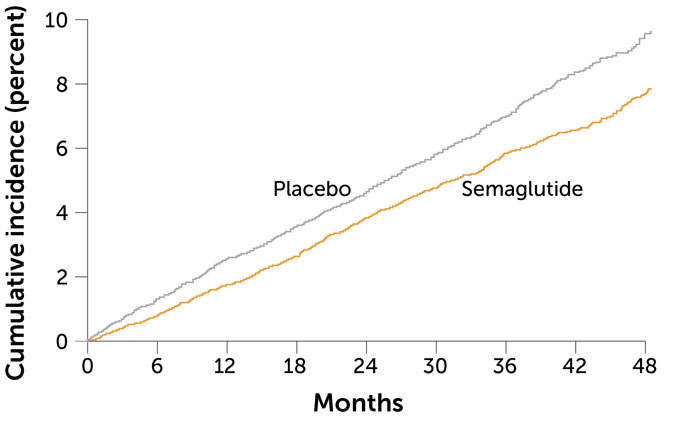Physical Address
304 North Cardinal St.
Dorchester Center, MA 02124
Physical Address
304 North Cardinal St.
Dorchester Center, MA 02124

In a groundbreaking clinical trial, the weight loss drug Wegovy, which contains the active ingredient semaglutide, has shown promising results in reducing the risk of heart attacks. The study, presented by Cleveland Clinic cardiologist A. Michael Lincoff at the recent American Heart Association meeting, has generated excitement among medical professionals and researchers.
The cause behind the reduced heart attack risk lies in the unique properties of semaglutide. Originally used to treat diabetes and obesity, semaglutide has already demonstrated cardiovascular benefits in individuals with type 2 diabetes. However, this trial marks the first time that semaglutide has shown positive effects on the hearts of individuals without diabetes.
One of the key causes of the reduced heart attack risk is the ability of semaglutide to target overweight or obese patients with cardiovascular disease. This expands the potential beneficiaries of the drug, as there are over 6 million individuals in the United States alone who are overweight or obese and have cardiovascular disease but not diabetes.
Additionally, the trial results indicate that semaglutide’s effects on heart health are not solely dependent on weight loss. The protective effects of the drug became apparent early in the trial, even before significant weight loss occurred among participants. This suggests that semaglutide may have direct mechanisms that boost heart health, independent of its impact on weight reduction.
Furthermore, the trial results highlight the potential of semaglutide as a game changer in the field of cardiovascular medicine. Cardiovascular disease remains a leading cause of mortality worldwide, and finding new treatments that offer incremental benefits is crucial. Semaglutide provides cardiologists with an additional tool in their arsenal to combat heart disease in overweight or obese patients.
However, it is important to note that the trial has certain limitations. The study primarily included white participants, with men comprising a significant majority. This lack of diversity raises questions about how semaglutide may work in different demographic groups. Expanding the representation of diverse populations in clinical trials is crucial to ensure that the benefits of medications like semaglutide are applicable to all individuals.
Despite these limitations, the results of the trial offer hope for individuals at risk of heart attacks. Semaglutide’s ability to reduce the risk of major cardiovascular problems by 20% is a significant finding. As researchers continue to analyze the data and gain a deeper understanding of semaglutide’s actions, the potential for this drug to revolutionize cardiovascular medicine becomes increasingly evident.
The next step will be to further investigate the mechanisms through which semaglutide improves heart health and to explore its efficacy in diverse populations. By addressing these questions, researchers can continue to refine the use of semaglutide and potentially unlock even greater benefits for individuals at risk of heart attacks.
The results of the clinical trial on semaglutide, the weight loss drug sold under the brand name Wegovy, have significant implications for heart health. The effect of semaglutide on reducing the risk of heart attacks and other cardiovascular problems is a breakthrough in the field of medicine.
The trial showed that patients who took semaglutide experienced a 20% reduction in major cardiovascular problems compared to those who took a placebo. This effect is substantial and offers hope for individuals at risk of heart attacks. The ability of semaglutide to lower the risk of nonfatal heart attacks, nonfatal strokes, and death due to cardiovascular causes is a significant step forward in combating cardiovascular disease.
Furthermore, the trial demonstrated that semaglutide’s impact on heart health is not limited to individuals with diabetes. Previously, semaglutide had shown cardiovascular benefits in people with type 2 diabetes. However, this trial revealed that even individuals without diabetes can benefit from the drug’s protective effects on the heart.
The effect of semaglutide on heart health is not solely dependent on weight loss. The trial results indicated that the drug’s positive effects on cardiovascular risk reduction became apparent early in the trial, before significant weight loss occurred among participants. This suggests that semaglutide may have direct mechanisms that improve heart health, independent of its impact on weight reduction.
With the approval of semaglutide for treating obesity and its demonstrated cardiovascular benefits, cardiologists now have an additional tool to address heart disease in overweight or obese patients. Semaglutide provides a new avenue for managing cardiovascular risk in this population, potentially reducing the burden of heart attacks and related complications.
However, it is important to note that semaglutide is not a panacea for obesity or cardiovascular disease. The drug does not address the underlying societal, environmental, and social factors that contribute to obesity and its associated health consequences. While semaglutide offers significant benefits in reducing cardiovascular risk, it is crucial to address the root causes of obesity through comprehensive lifestyle changes and public health interventions.
As researchers continue to analyze the data from the trial and gain a deeper understanding of semaglutide’s actions, the potential for further advancements in cardiovascular medicine becomes evident. The next steps will involve investigating the mechanisms through which semaglutide improves heart health and exploring its efficacy in diverse populations.
Overall, the effect of semaglutide on heart health is a breakthrough in the field of medicine. It offers hope for individuals at risk of heart attacks and provides cardiologists with a valuable tool to combat cardiovascular disease. While there are still questions to be answered and further research to be conducted, the impact of semaglutide on reducing the risk of heart attacks is a significant stride towards improving cardiovascular health.
If you’re wondering where the article came from!
#